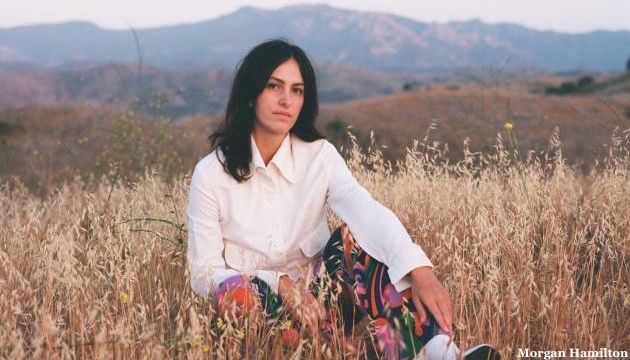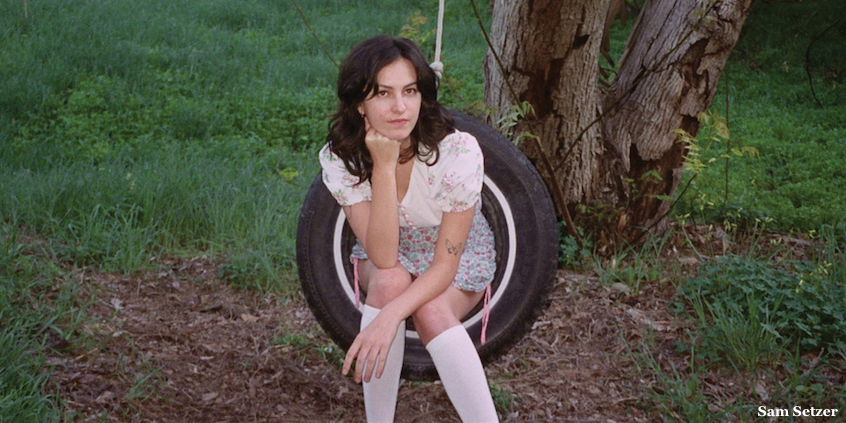Alyssa Gengos – How Solitude Led To Sweetness

It would be quite the challenge to find someone who embodies the DIY ethic more than Alyssa Gengos. The Southern California-based artist wrote, recorded, produced, and played nearly every instrument on her upcoming album, Mechanical Sweetness, which is due out February 25th.
With deeply personal lyrics, breathy vocals, and soft synths and guitars, Mechanical Sweetness is the first album Gengos is releasing under her real name. Previously she released music under the moniker Kythira, but she notes Mechanical Sweetness signifies something major for her, saying, “I’ve put more thought into it than I ever have really with any of my music before.”
I recently caught up with Alyssa Gengos, and during our conversation she revealed some of her creative process, including the emotional qualities of solitude, the dreams she embraces, and the roles they each played in the creation of Mechanical Sweetness.
Mechanical Sweetness is your first album under your own name, but previously you made music under the moniker Kythira. Did Kythira have to disappear for Alyssa to fully bloom, or was Kythira just a version of yourself you simply outgrew?
I think that mostly I outgrew it.
I began using that name because … I was just figuring out the style of music I wanted to make, or what kind of instruments I wanted to play, and it was sort of a way for me to test run a lot of things.
I started working on the material for this album, and I realized that I had finally reached a place where I felt comfortable releasing music under my own name, which was always a goal of mine. Plus, it felt separate from everything I’ve released under Kythira, because there are more instruments involved, it’s a fuller sound, and even though I did 95% of the things on the album it still felt like there were more people involved. That’s why I decided it was time to suck it up, and stop being so nervous about using my own name.
When you say you did 95% of the things on the album, I know that included all of the writing, producing, and recording. What did you find were some of the pros and cons of having complete control?
I think the biggest thing for me is that I want to feel I’m as comfortable as possible when I’m writing, recording, etc. For me that means being completely alone, basically, and having the freedom to make mistakes, and not feel like there’s anyone else judging a decision I make. Maybe I’m unsure about something, and then it turns out I end up liking it, or maybe I really like something, and it turns out it’s really bad, and I have to change it. I just prefer to go through that process on my own. I really want to dial in to how I feel about it, and once it’s finished that’s when I want other people’s opinions.
You’re not a recluse, though. This isn’t a Boo Radley situation.
I definitely talk to other people while I’m making my music. I send ideas to friends sometimes, and say, “What do you think of this? Do you like this, or do you like this better?”
I will ask other people, but in terms of the actual writing, and recording process, that’s all just me on my own.
I think it also gives me a lot of time. It’s really hard to get people together to rehearse to play shows, to rehearse to record. I have a full time job, so I can’t do things at the drop of a hat like other people. I just have to make time when I have time, and working alone gives me the freedom to do that.
You’ve also previously said solitude allows you to be vulnerable. What other emotional qualities do you find rise to the surface when you’re by yourself?
I think it allows me to be kind of hard on myself in terms of my lyrics
feel like if I’m with other people everyone kind of wants to present themselves as the best version of themselves, but when I’m alone I can sort of say you know what, obviously I’m not perfect, maybe I did this wrong, maybe I could’ve done this differently. I think that helps in terms of writing lyrics.
Also, solitude just instills a sense of calm. I think that’s the biggest things for me. It allows me to be vulnerable, it allows me to reflect on myself with an honest lens, and it allows me to not get too worked about something.
Do you think the calm allows you to be hard on yourself, of does being hard on yourself make you calm?
I think the calm allows me to be hard on myself, because I feel safe. When I’m working on songs alone it feels like I’m the only one who’s gonna hear them.
The period between recording the songs, and when they’re actually gonna be out for everyone to hear, once I go through that – and it’s a pretty long time, I finished recording these songs last March, probably, so it’s been almost a year – it’s been enough time for me now where I’m OK with sharing them, because I’ve had space from those experiences, and it doesn’t feel like I’m writing songs and then playing them at a show the next week.
Are there any emotions you feel would only come out via collaboration?
I think if I were writing, or recording with other people there would probably be some kind of excitement, or maybe power that would be harder for me to get on my own.
When I’m working on my own obviously there’s no one in the room cheering me on, or pushing me to do something, so I have to make a lot of those decisions myself, but if there’s someone else the chances of me doing something more out of my comfort zone are probably higher.
It’s always nice to get a pat on the back.
Yeah, exactly. So probably more confidence at that point.
It’s interesting that vulnerability comes when you’re solo, but confidence comes through collaboration.
Well, I think with collaboration there’s the opportunity to be more confident, but there’s also the opportunity to be a lot more anxious. Whereas working alone is more of a level playing field – it’s harder for me to feel really strongly either way. I think it’s mostly I feel like this is going good, or I feel like this isn’t the best, but it’s never like oh my God I’m horrible, or oh my God I’m a genius.
I know dreams played a big role in the creation of Mechanical Sweetness, as your dreams inspired many of the songs. How often do you wake up in the morning, remember a dream, and think – I need to dive deeper into this?
You know it’s weird, I go in phases. Sometimes I’ll have a month where I remember every dream I’ve had, and sometimes I won’t remember a dream for as long as I can remember. Usually, if it’s something that involves people I know other than myself, that’s when I remember it more.
A lot of my dreams are something that I do alone, or there are other people in the dreams, but I don’t really remember who they are, or how they relate to me, but when I have dreams about real people in my life, and I know their names, and I’m interacting with them in the dream, that’s usually what sticks with me the most. Those are the kind of dreams where you wake up, and then if you see that person you’re like oh my God, that didn’t happen in real life, that was just in my dream, but it feels like a real experience. Those emotions stick around, and those feel real.
Are there any dreams you wake up from and say – let’s leave that one alone?
Oh yea, for sure. {laughs}
Usually those are like if I’ve done something bad. I don’t have those very often, but once in a while I get them, and I’m like OK, yup, I’m gonna forget about that completely.
Moving from dreams to reality, you moved from the suburbs of L.A., to NYC, and then back to L.A. What did you miss about L.A. when you were gone, and what do you miss about NYC now?
When I first moved out of L.A. I was pretty sick of it. I’d lived here most of my life. I lived in the suburbs, so until you could drive you couldn’t really do anything. It’s not like you could hop on the subway and hang out with your friends as a kid, so I spent a lot of time alone, and I was really eager to leave that.
Then, of course, I started missing home pretty soon after I got to New York.
The things I missed the most – definitely the calmness, and the separation you get from people when you live in L.A., or really anywhere in the larger L.A. area.
There are certain parts of L.A. that are more like New York, but I’ve never really lived in that kind of area, so the good thing I missed was the pace of life, and not having the pressure to do something, and be with people at all times. That was very much my New York experience, never really having a chance to catch my breath, always at work, or commuting, or going to a party, or going to a class. It was very nonstop.
I always thought, “I’m gonna stay in New York. I’m gonna rough it out, stay here as long as I can, as long as it’s fun, and then I’ll move back to California eventually.” That came way sooner than I expected.

Being here, I think the thing I most miss about New York is the people. Even if I’m not one to want to be with people all the time, I still think that the people I knew, and still know, in New York, and the people that I don’t know, all the people that move there every year from all over the world, that, to me, was the most inspiring part of it. I was always meeting new people. There were always people coming and going.
In a city like L.A. it’s a lot harder to put yourself in situations where you’re meeting a lot of new people all the time, especially if you live in a smaller neighborhood. I do miss that sometimes, because I like being surrounded by a lot of people, just kind of the concept of people, not necessarily being friends with 200 people at once, just having new people in my life, having new sources of inspiration, even if I only met them once, or had one conversation with them, I think that’s what I miss the most.
Finally, what should people know about Mechanical Sweetness before clicking play?
I think that it’s quite a personal album, and I feel like a lot of the themes I talk about, like the general themes, are pretty relatable. I think they’re human experiences, things we’ve all felt in one way or another, but obviously they’re about my specific experiences.
I would say before you listen to it, take it for what it is. If it resonates with you, if you can relate to it, that’s what I hope for the most. If you can’t, then I hope that you find parts of my life interesting, and if you don’t, I hope that you like the music at least.
For more Alyssa Gengos, follow her on Instagram, Facebook, and Twitter, and check out her music on Bandcamp.

Comments